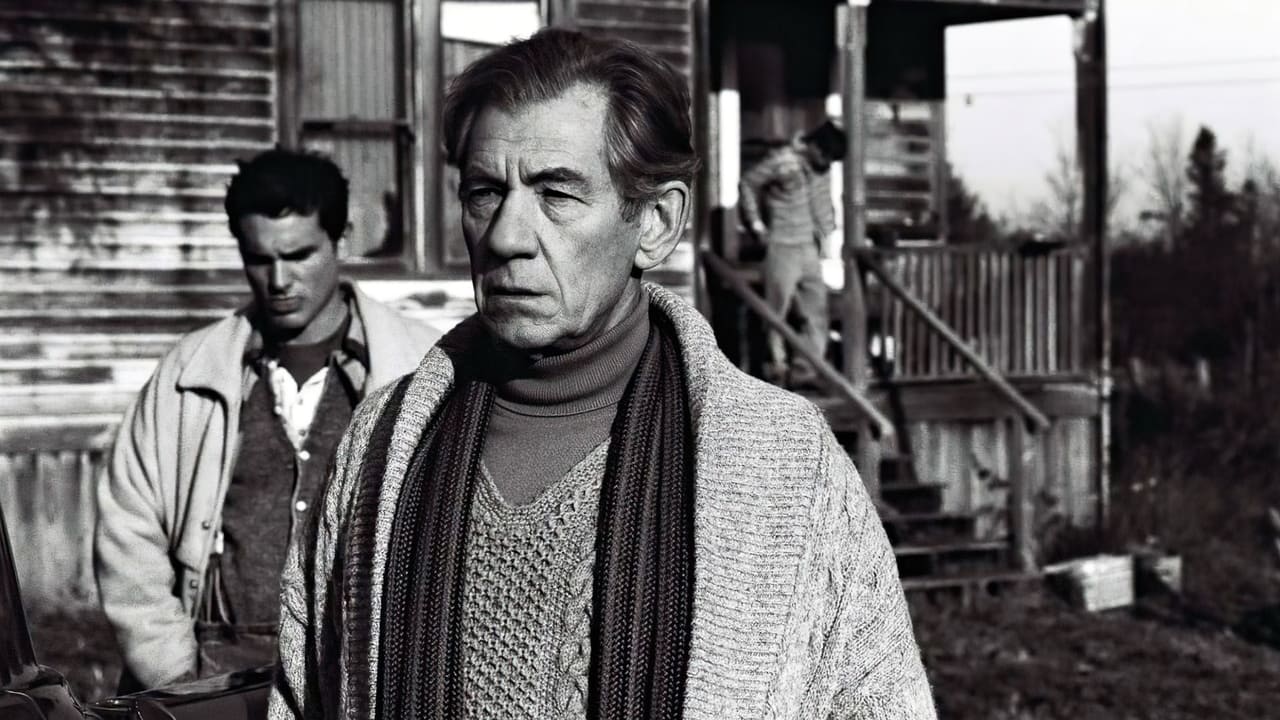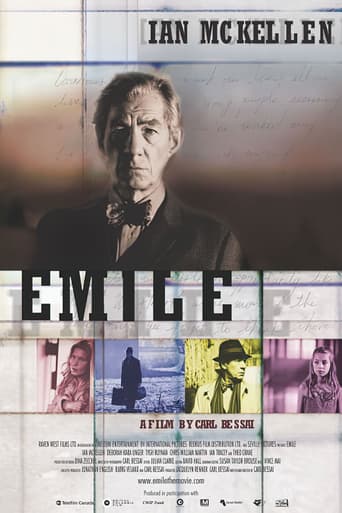



Self-important, over-dramatic, uninspired.
Perfectly adorable
This is a tender, generous movie that likes its characters and presents them as real people, full of flaws and strengths.
View MoreA terrific literary drama and character piece that shows how the process of creating art can be seen differently by those doing it and those looking at it from the outside.
View MoreEmile is a Canadian independent film which, unlike some of its more recent American counterparts, isn't afraid of exploring bare-boned, delicate territory without either constructing portraits of its characters as total freaks or necessarily feeling the need to deceptively 'mainstreamise' its overall content with generally offbeat material and off-colour, idiosyncratic dialogues. Sure, they touch on some rather delicate topics, ranging from unanticipated pregnancy to various mental illnesses to those fond of sadomasochism, but rarely do we feel as if the characters in projects such as Juno or Secretary actually exist – they are fanciful excursions into realms populated by those we are wary of rather than sympathetic of, and more often than not carry with them excess levels of vanity. In Carl Bessai's 2004 film Emile, we feel as if we could live down the street from them; his film is one of which explores a man and the results that came about after his decision, during young-adulthood, to put himself before others, regardless of the riches that decision had him end up with, before returning to the locale of his young-adulthood years and piecing together the second generation of his family's situation that has been brought about because of this.The film covers that of the titular Emile, played extraordinarily by British actor Ian McKellen; a performance full of nuance and delicacy, a performance seemingly lost amidst the bigger budgeted, larger distributed Lord of the Rings and X-Men sequels of the same year in which he additionally starred, but a performance fraught with authenticity and affluence as he comes to integrate with varying supporting acts of differing ages; genders and apparent class backgrounds. Indeed, the film will open on the England based, but Canadian born, author of later on in years Emile; the aftermath of a speech at a large function seeing him very much the centre of attention and seemingly at the peak of his proverbial academia-imbued game. The camera decides to track in on Emile, in a wavy and distorted manner, as if cause for concern was required amidst the rapturous applause and success story that is this man: the film's eventual framework alluded to as here, as the bearing in on the surface qualities of a man and into something more troubled, plays out.Through one means or another, Emile winds up back in Canada again; the receiving of an honorary degree from an institute in his home province of Saskatchewan the catalyst from the outside forcing him back to his roots, allowing apparent issue and such to be buried. It's here the character of Nadia, Emile's niece, enters proceedings; someone brought to life by that of Canadian actress Deborah Kara Unger, whose general facial expression in whatever film she's in always seems to epitomise that of anguish or one that is wrought with the weight of the world. She has certain things on her shoulders here, the woman clearly outspoken and rather vocal – refusing first impressions on that of anyone; her daughter Maria undergoing, what we presume to be from an early exchange with her mother, a rather strict upbringing as she comes to terms with her own life situation of being forced into moving states to get away from an ex-husband.It is a situation, the escaping of one's family-imbued problems and leaving on negative terms as trouble brews within a family unit, that echoes that of Emile's; his decision to initially leave Canada being what it is, when the establishment of his back-story to do with his two brothers is what it is. Out of these beginnings, it is made obvious that Emile and Nadia's friendly connection might be read into as being born more out of other items than merely that of quaint family ties. Being relocated in Canada for this brief period allows Emile to hark back to the past; specifically, the ability to look back at his time as a young man with his thoughtful and more humane brother Freddy (Runyan) and his bigger, more primitive sibling Carl (Martin), whose aggression and such on the farm that they're based spawns degrees of conflict. Emile's consequent leaving of this aforementioned unit to study in England, usually the land of academia in these instances, leads him to be the man he is now but seemingly at the cost of a close tie with Freddy, whose own promise leads to its own respective conclusion. Bessai weaves the back-story to that of what happened to Emile in with the present strand wonderfully well; the execution, as specific analeptic manipulations play out furthermore within the flashbacks, are handled with such competence and guile, that it is difficult not to become so involved. Indeed, the results are naturalised; involving, brooding and really rather good.
View MoreYou are well into the second quarter of this film before you can figure out just who is who. The frequent flashbacks, done in a style that would work better on a stage than on the screen, are confusing until you figure out what is happening. Nevertheless it is a warm picture with a good cast and a straightforward plot that generates some very human moments. At least it's a film --- and a reasonably decent one --- that shows Canada as Canada and not disguised as a stand-in for some place in the US. It's obviously done on a low budget with an unknown cast but that does not have a heavy impact on quality. There is some young talent here on both sides of the camera. Not a great film, but not a bad one either.
View MoreWonderful performances by all actors involved, Ian McKellen especially gives a typically intelligent and nuanced rendering. The plot is solid, but the main flaws lie in the tedious direction, cinematography and editing. Flashbacks are overused and signalled with horrendous transparency. The direction is terribly heavy-handed, which is unfortunate; plot-lines that are already capable of arousing viewer sympathy are then dwelled upon with even less subtlety. The ponderous soundtrack would be palatable under normal circumstances, but rapidly becomes irritating when prefaced by a "have you ever...?" question and combined with slow-motion, sepia effects. There is also a problem with the audio, where inconsistent mixing/mastering have allowed too many low-mids in the mix about half of the time, making some of the dialogue indistinct.Worth watching if you appreciate Ian McKellen's work, but expect to lose interest by the end.
View MoreUnlike many movies discussing family, Emile focuses on the relationship among brothers, among uncle and nieces. Sometimes, it is a lot of so-called obligations between father/mother and son/daughter. The bond is too strong to escape from it. It is more romantic, as holiday hobby is more romantic than weekday job. There are a lot of space for one's free will, a man doesn't have to scarify just because he is someone else's whoever.It is why I can only partially agree with the footnote of the movie `it is a movie about human being rather than human doing.' He has choice, what he has done of course decides what he is. I just grasp something from existentialism.Compare to the director's previous work, Lola, the movie with a younger woman as leading character, I can identify myself with the characters in Emile more. People in Emile suffer more struggles inside their hearts. Lola does experiences many exciting and fantastic, and she does suffer something. However, I can't find any identity in her `innocent' expression.It is an interesting thing when the movie reminds me of another Ian McKellen's great acting, Gods and Monsters. Maybe it is because of the way of describing, putting now and then, reality and imagination together in the same picture. (It made me think that `Ian McKellen's acting is similar to his previous one' at first. Actually, Emile and James Whale are built much different.) Director Carl Bessai spent much effort to build up such the atmosphere of what happens in an old man's mind, much more than Bill Condon did, in my `humble' opinion, a little too much. Carl Bessai chose still rather than action. It seems to express the idea `human being rather than human doing'. It is also a trade off a director must take.In a picture, a motion picture, the present and the past are seamlessly married, but not in a logic. The screenplay doesn't give a good and strong reason to release the ice wall between Emile and his niece, Nadia. A strong ending doesn't mean exciting action or whatever else. Of course, you can choose a tranquil way, but the most tranquility has huge surges beneath.Ian McKellen's acting is so convincing, Emile seems a part of himself. (Maybe he would protest that there is no a single character can present himself.) It is rare that a veteran actor can bring a sense of innocent. And Deborah Unger surprises me much. Her coldness toward Ian is the most incredible, because it is also rare that a young actress can build up such tense to someone much older than herself, rather than go in the same direction. Tygh Runyan did not act much in the movie, but he has a sensitive looking.
View More